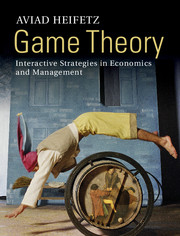Book contents
- Frontmatter
- Contents
- Foreword
- Part I Strategic interactions as games
- Part II Basic solution concepts for strategic form games
- Part III Prominent classes of strategic form games
- Part IV Uncertainty and mixed strategies
- Part V Advanced topics in strategic form games
- Part VI Dynamic games
- Part VII Repeated games
- Index
Part II - Basic solution concepts for strategic form games
Published online by Cambridge University Press: 05 August 2012
- Frontmatter
- Contents
- Foreword
- Part I Strategic interactions as games
- Part II Basic solution concepts for strategic form games
- Part III Prominent classes of strategic form games
- Part IV Uncertainty and mixed strategies
- Part V Advanced topics in strategic form games
- Part VI Dynamic games
- Part VII Repeated games
- Index
Summary
INTRODUCTION
In Part II we will explore the basic solution concepts for strategic form games. The strongest solution concept of all, introduced in Chapter 3, is that of strongly dominant strategies. A strongly dominant strategy is one which is strictly preferable for the player irrespective of the choices of the other players.
We will see, though, that – somewhat surprisingly – even when all players have strongly dominant strategies, the outcome of the strategic interaction might be inefficient, and all players wish they could have coordinated to play a different strategy profile. The prime examples of this phenomenon are the two-player games of the Prisoner’s Dilemma type, called also “social dilemma” games.
A somewhat weaker solution concept, also discussed in Chapter 2, is that of weakly dominant strategies. A strategy is weakly dominant if, irrespective of the choices of the other players, the strategy is never inferior to any other strategy the player could have chosen, and for some strategy profile of the other players it is strictly better than all the alternative strategies available to the player. When each player has a weakly dominant strategy, the game is said to be solvable by weak domination.
A second price auction, which is akin (though not identical) to the one carried out in eBay and other online auctions, is an example of a game in which each bidder has a weakly dominant strategy – namely to bid the maximum amount she is willing to pay for the auctioned good. Upon winning, she will be paying only the second-highest bid, and hence any other bidding strategy is weakly dominated: bidding more than one’s maximum willingness to pay might lead to winning but paying more than this maximum, while bidding less than this maximum might lead to losing an opportunity to win the auction at a profitable price.
- Type
- Chapter
- Information
- Game TheoryInteractive Strategies in Economics and Management, pp. 19 - 22Publisher: Cambridge University PressPrint publication year: 2012



